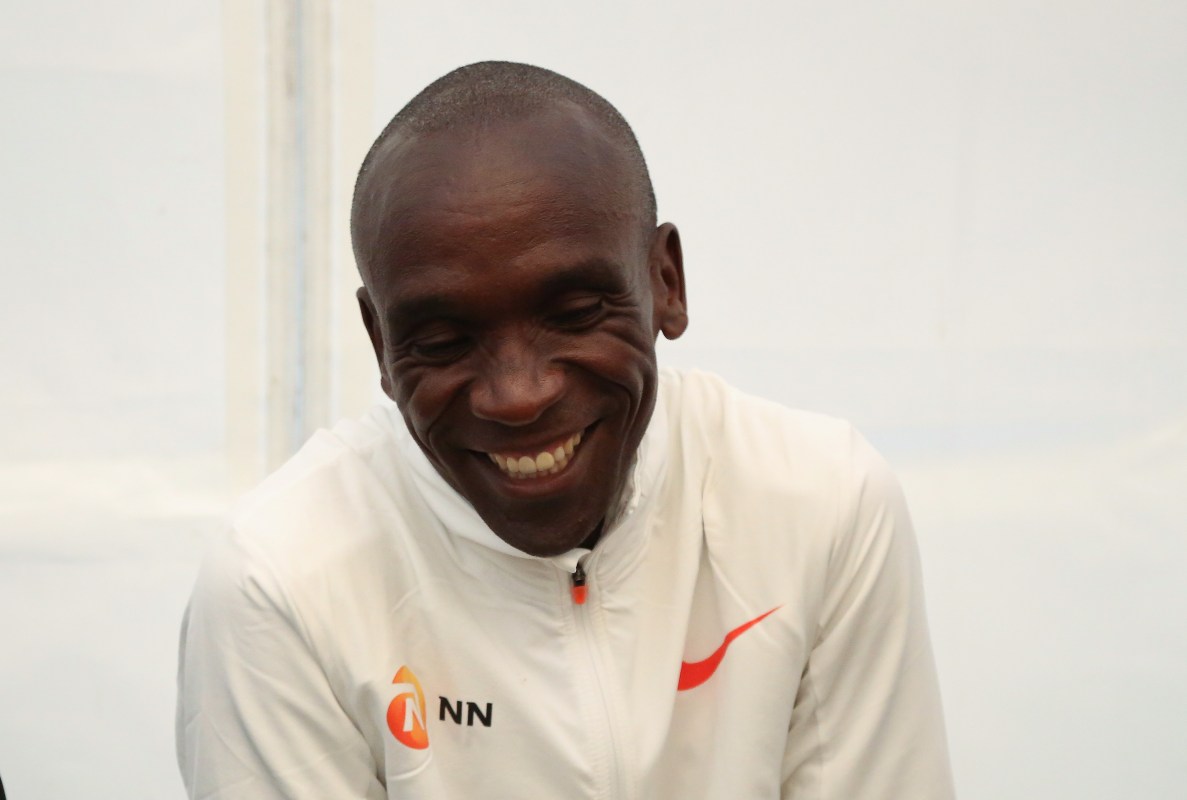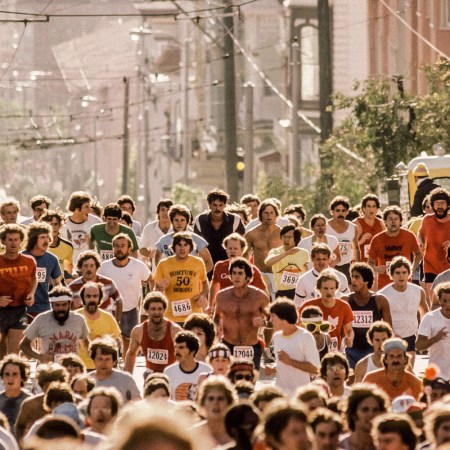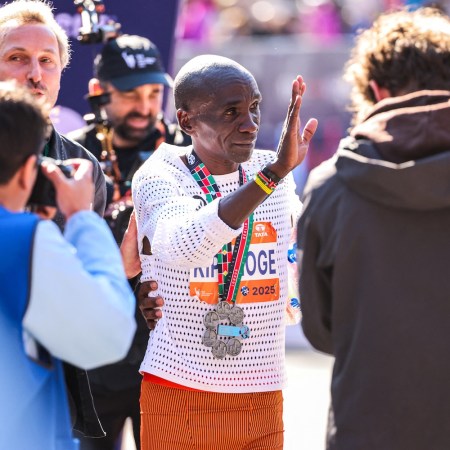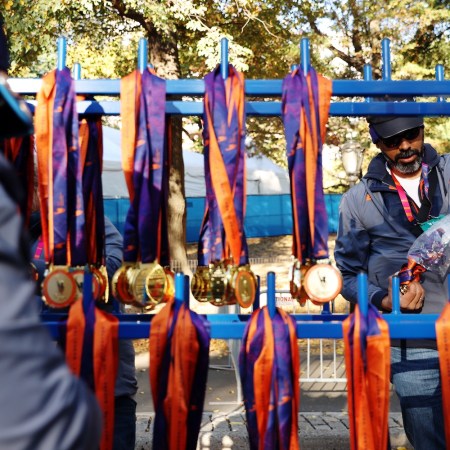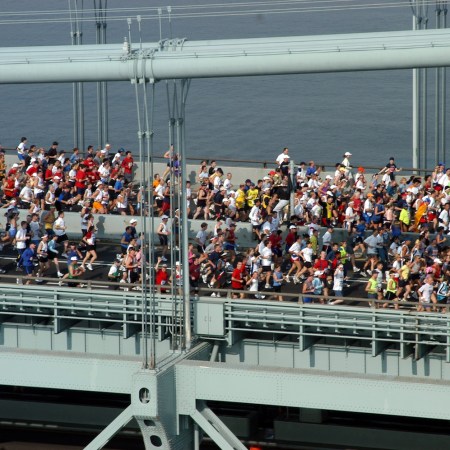Midway through the London Marathon in 2020, Eliud Kipchoge started to fall off the pace.
This defied reason. He’d won his last 10 marathons in a row, including four of the last five London Marathons. It would’ve been five had he not sat out the 2017 spring season to try and break two hours in a Nike-led project at Monza, the iconic Formula 1 racetrack. (He ran a 2:00:25, then ran a 1:59:40 two years later, over a similarly “staged” effort in Vienna.)
So to see Kipchoge drift from the front at the end of 2020, however bizarre the year’s iteration of the event was — on account of COVID, it was run in the fall and featured multiple loops around the city’s St. James’s Park — was firmly less likely than seeing the Kenyan win the race. The last time he hadn’t won a marathon was in 2013, when he’d finished just 40 seconds behind his countryman Wilson Kiprotich — who’d set a world record.
Kipchoge refused to make any excuses a couple years ago in London, though reports quickly emerged that he’d been battling a blocked ear (which impaired his breathing) and a cramped hip on the way to a relatively pedestrian eighth-place finish.
But any knocks on the now-37-year-old’s mortality were greeted swiftly with a win at the NN Mission Marathon in The Netherlands (an elite-only qualifier sponsored by his very running team) and two wins in Japan (the Summer Olympics in Sapporo, and the Tokyo Marathon, where he set a course record).
Then came this past weekend, and one of the greatest athletic achievements we’ve ever seen.
This Sunday in Berlin, Kipchoge shaved 30 seconds off his previous marathon world record; in 2018 he’d shaved 78 seconds off the previous record…which was already the biggest improvement in marathon time in a half-century. Some of his contemporaries, like the Ethiopian Kenenisa Bekele, have had two or three showings where they’ve pushed themselves to 2:03:00 or below. But no marathon runner has ever made that time feel inevitable, or a proper sub-2:00:00 (sans phalanx of pacers!) feel possible.
It begs the question: Has the sports world appropriately appreciated what Kipchoge has accomplished these last 10 years?
You can go back another decade, if you like — he’s been winning international track and field and cross country since events since the year 2002, when he was just 18. But it’s the specific championship corridor that he opened back in 2013, during which he’s won 15 of 17 marathons (11 of them World Majors, two of them Olympic gold medals) that boggles the brain.
Kipchoge is the best marathoner ever. Forget whatever rumors you’ve read about his “unfair” Nike sneakers with their carbon-plated, planet-destroying technology. Every professional runner alive today has access to foamy supershoes. Brands like Adidas, Brooks and Saucony and had to catch up to Nike’s R&D team in order to keep selling shoes and keep their sponsored runners happy. But Kipchoge still beat his closest opponents by five minutes the other day.
When he set the record in Berlin four years ago, a post on LetsRun.com invoked Wilt Chamberlain’s 100-point game. The idea being: this is a single-event, one-off performance by an athlete head and heels better than his contemporaries, the likes of which we will never see again.
It’s a clunky comparison; not the least because Kipchoge…did it again, but also because it transmutes the magnitude of his accomplishment through the lens of a more mainstream team sport. What Kipchoge pulled off the other day shares more DNA with Alex Honnold’s free solo of El Capitan than, say, a pitcher tossing a perfect game.
You can always just share the numbers, and it’s possible that they’ll register for some of the population.
Here: Kipchoge’s first 10K of the race would’ve placed 18th out of the 25 men who qualified for the event at the Tokyo Olympics. Only, he still had 20 miles to go! Or this one: his initial half-marathon split of 59:51 was the fastest in marathon history, less than half a minute off his personal best in 13.2. Had it been run in the early 1990s, it would’ve been a world record. And finally: the man averaged a mile pace between 4:35 and 4:40 for two hours. If you’ve got a competitive 5K anywhere near your hometown, the winner might dip below 16 minutes. Kipchoge can average a 14:21 5K eight times in a row.
The problem with these sorts of figures is that for many, they seem so outrageous they’re impossible to contextualize or vaunt accordingly. Most of the population couldn’t beat Kipchoge on an electric bike. He might as well be from a different planet, or from the future.
Not to mention, because running is a highly popular participator sport, but not a particularly popular spectator one, casual runners (and friends and family of casual runners), are sometimes as impressed by a runner dipping below 16 minutes in the 5K as one dipping below 14. To them, it all sounds insane.
Then there’s the sheer nature of streaming a full marathon, compared to tuning in for one of Usain Bolt’s 100-meter events in 2008, 2012 and 2016. Those were must-watch events in part because they were tremendously easy to watch. The gun went off, a grinning Bolt wiped the field and he then found ways to include the entire crowd in his victory lap. It felt like we’d all won, too.
Marathon superiority doesn’t have the same turnkey marketability. Kipchoge has his Nike sponsorship, obviously, and some lucrative regional brand partnerships (Isuzu East Africa pays him millions a year), but he wasn’t featured on SportsPro’s list of the 50 most marketable athletes in the world. He has just 1.9 million Instagram followers. That’s a lot, for a runner, but for a GOAT? Nowhere near the likes of Federer, Lebron, Messi.
Kipchoge is likely the least heralded greatest athlete of all time. That’s no fault of his, and if you’ve ever heard the guy speak — or simply watched how he finishes a race, with a remarkable, cherubic smile on his face — you’d know that’s no concern of his, either. He is one of the most at-peace competitors on Earth, and through an era where many athletes have credited their success to a cutthroat, “win at all costs” mentality, he has simply bubbled along — zen, calm and in control.
More Americans may soon know Kipchoge’s name, before it’s too late and he hangs up his flats for good. Chasing records over the years, Kipchoge has not yet run New York (which runs slow) or Boston (which isn’t a loop, and doesn’t qualify for IAAF standards). But having now raced and won Berlin, Chicago, London and Tokyo, Kipchoge has been vocal about his desire to win all six World Majors.
Could the man set course records on either of America’s most iconic courses as he approaches his 40th birthday? Of course he could. To know of Kipchoge is to never doubt him. And if you don’t know of him, just imagine Tom Brady completing a two-minute drill on Mt. Everest. Or something. This particular GOAT resists comparison. And that’s perfectly okay.
The Charge will help you move better, think clearer and stay in the game longer. Subscribe to our wellness newsletter today.
